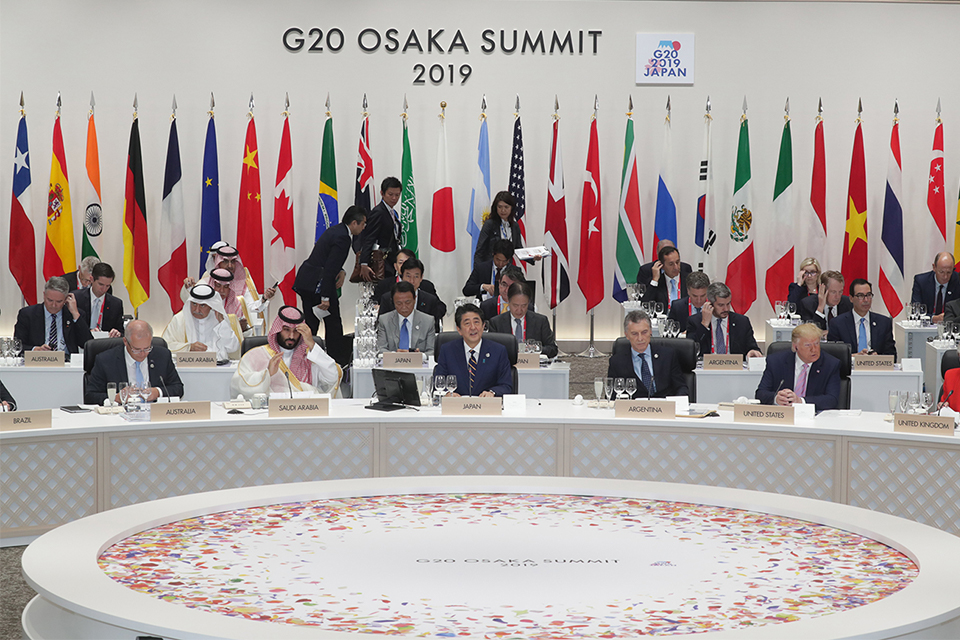

On 1 December, Saudi Arabia formally assumed the presidency of the G20 group of the world’s most powerful nations. The kingdom’s year in the chair of the G20 will culminate on 21-22 November 2020, when King Salman bin Abdulaziz al-Saud hosts the fifteenth G20 leaders’ summit in Riyadh.
 The event will see the world’s most powerful politicians, business people and non-governmental organisations gather in Saudi Arabia to agree and coordinate global initiatives aimed at promoting economic stability, sustainable development, female empowerment, human capital enhancement, and an increased flow of trade and investment.
The event will see the world’s most powerful politicians, business people and non-governmental organisations gather in Saudi Arabia to agree and coordinate global initiatives aimed at promoting economic stability, sustainable development, female empowerment, human capital enhancement, and an increased flow of trade and investment.
The summit provides the kingdom with an opportunity to present itself as a leader on the world stage, beyond the region and outside of the energy sector. And Riyadh clearly intends to take full advantage of the opportunity, announcing plans to host more than 100 events and conferences in the year ahead of the summit.
Conservatives in Saudi Arabia might be uncomfortable with Riyadh assuming such a high-profile position of international leadership. Saudi Arabia traditionally has preferred to do its dealings in private, away from the spotlight and Riyadh has long played the role of regional power broker, pulling its levers of influence – money and religion – from the background of events.
Traditionalists are uncomfortable at the increased levels of scrutiny and criticism that inevitably fall on the kingdom and its traditions as a result of a more visible and open international engagement.
Meanwhile, critics and opponents of the Saudi government, both inside and outside the kingdom, say its record on human rights, female empowerment and lack of transparency mean it is not suited to the role.
Saudi Arabia has little choice, however, and Riyadh’s policies are inevitable and permanent, if not always well executed.
The kingdom’s growing population is creating huge social pressures that can only be satisfied by new jobs and better living conditions, while the structural decline in oil prices means new sources of wealth generation are needed. Riyadh must not only continue to drive the diversification of the Saudi economy, but accelerate it. It must end the country’s dependence on oil, reduce its dependency on state spending, and continue to take steps to create an entrepreneurial economy that creates new jobs and allows Saudi Arabia to compete for investment and markets.
Wide-ranging reforms
 The kingdom’s reformers, led by Crown Prince Mohammed bin Salman, do not want to get rid of the country’s traditions, but they demand the transformation of many established practices of government that they say are holding the kingdom back.
The kingdom’s reformers, led by Crown Prince Mohammed bin Salman, do not want to get rid of the country’s traditions, but they demand the transformation of many established practices of government that they say are holding the kingdom back.
They are ripping up the established playbook. Traditional fiefdoms of senior royals have been removed, with ministers replaced and ministries restructured. New or restructured organisations such as the Public Investment Fund and a series of project management offices have emerged to improve the management of the country’s spending. The economy is being opened up to the private sector, including the recent successful flotation of 1.5 per cent equity in Saudi Aramco.
Increasing the kingdom’s international outreach is a key part of the reform agenda. Engaging with and leading international initiatives such as the G20 is an essential part of the plan. The G20 objectives align closely with the vision of Saudi Arabia’s modernisers.
At the same time, Riyadh has increased its activity on the geopolitical stage, again not always with the intended consequences. Riyadh has been blamed for causing a humanitarian crisis in Yemen after it intervened to defend the government of President Abdrabbuh al-Hadi in the face of an uprising from Houthi rebels, which Riyadh says are agents of Iran. Saudi Arabia has also come under criticism for causing an unnecessary crisis in the GCC when it, together with the UAE, Bahrain and Egypt, announced an embargo on trade and diplomatic ties with Qatar.
Saudi Arabia’s international actions have been criticised for increasing uncertainty in the region. Riyadh denies this, accusing Tehran of trying to destabilise the kingdom and region through aggressive actions against the interests of Saudi Arabia and its allies in Iraq, Syria, Yemen and Lebanon. It says its actions are needed to counter Tehran’s ‘malign’ influence.
 While some of its actions have been executed badly, Saudi Arabia’s activity in the international arena is an inevitable consequence of the US’ decision in 2012 to shift its focus from the Middle East/European sphere towards East Asia and China.
While some of its actions have been executed badly, Saudi Arabia’s activity in the international arena is an inevitable consequence of the US’ decision in 2012 to shift its focus from the Middle East/European sphere towards East Asia and China.
President Barack Obama’s East Asia strategy, known as his ‘Pacific Pivot’, represented a significant shift in US foreign policy and removed much of the protective umbrella provided by Washington to Saudi Arabia and other US allies in the region.
In a highly unusual move, Riyadh publicly criticised the shift in US policy and warned of the consequences as far back as 17 December 2013, when the then-Saudi ambassador to the UK, Prince Mohammed bin Nawaf al-Saud, wrote an op-ed piece in the New York Times, in which he said: “We believe that many of the West’s policies on both Iran and Syria risk the stability and security of the Middle East.
“This is a dangerous gamble, about which we cannot remain silent, and will not stand idly by …. The foreign policy choices being made in some Western capitals risk the stability of the region and, potentially, the security of the whole Arab world. This means Saudi Arabia has no choice but to become more assertive in international affairs; more determined than ever to stand up for the genuine stability our region so desperately needs.”
Prince Nawaf’s words remain as pertinent today as they did six years ago. Confusion over US policy in the Middle East has increased since 2012 and is unlikely to abate any time soon, leaving Saudi Arabia and other US allies in Abu Dhabi, Cairo and Manama to carve out new relationships.
You might also like...

Market snapshot of Mena data centre projects
29 April 2024

Jordan progresses Kingdom hospital
29 April 2024

Construction step change boosts order books
29 April 2024

Aramco signs China petrochemical agreements
29 April 2024
A MEED Subscription...
Subscribe or upgrade your current MEED.com package to support your strategic planning with the MENA region’s best source of business information. Proceed to our online shop below to find out more about the features in each package.





